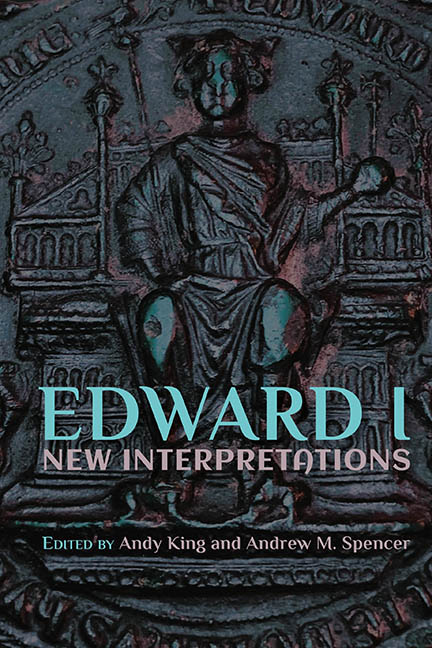Book contents
- Frontmatter
- Contents
- List of Contributors
- Acknowledgments
- Abbreviations
- Genealogy of Edward I
- Introduction
- 1 The Lord Edward and the Administration of Justice across his Apanage, 1254–72
- 2 A Tale of Two Ministers: Robert Burnell, Walter Langton and the Government of Edward I
- 3 Law and Order in the Reign of Edward I: Some New Thoughts
- 4 Magnates, Ritual and Commensality at Royal Assemblies: Bogo de Clare and Edward I’s Easter Parliament, 1285
- 5 Royal Daughters and Diplomacy at the Court of Edward I
- 6 Hearts and Bodies: Edward I and the Scottish Magnates, 1296–1307
- 7 Edward I and the Blessed Virgin Mary
- 8 Letters and Political Discourse under Edward I
- 9 Crisis? What Crisis? 1297 and the Civil War that Never Was
- Index
1 - The Lord Edward and the Administration of Justice across his Apanage, 1254–72
Published online by Cambridge University Press: 21 March 2020
- Frontmatter
- Contents
- List of Contributors
- Acknowledgments
- Abbreviations
- Genealogy of Edward I
- Introduction
- 1 The Lord Edward and the Administration of Justice across his Apanage, 1254–72
- 2 A Tale of Two Ministers: Robert Burnell, Walter Langton and the Government of Edward I
- 3 Law and Order in the Reign of Edward I: Some New Thoughts
- 4 Magnates, Ritual and Commensality at Royal Assemblies: Bogo de Clare and Edward I’s Easter Parliament, 1285
- 5 Royal Daughters and Diplomacy at the Court of Edward I
- 6 Hearts and Bodies: Edward I and the Scottish Magnates, 1296–1307
- 7 Edward I and the Blessed Virgin Mary
- 8 Letters and Political Discourse under Edward I
- 9 Crisis? What Crisis? 1297 and the Civil War that Never Was
- Index
Summary
ON 14 February 1254 at Bazas in Gascony, Henry III conferred upon his eldest son, the Lord Edward, the first ever apanage in English history. Initially conceived to cement the alliance with Alfonso X of Castile and to secure Edward's marriage with Alfonso's half-sister, Eleanor, this apanage encompassed a vast collection of territories which originally included, with some exceptions, all the royal lands of Ireland, the county of Chester and the royal conquests in Wales.1 Also granted to him were various towns and castles across the Midlands and on the Anglo-Welsh border, the duchy of Gascony, the Isle of Oléron and the Channel Islands. Aged only fourteen in February 1254, Edward became the second largest landholder of the kingdom after his father.
Along with extensive territorial possessions, Edward was bestowed with significant powers to control and administer his estates. Although Henry III regularly intervened within his son's apanage, Edward theoretically supplanted his father in these territories and was supposed to govern freely according to his will and to the laws and customs of each region. This was particularly so concerning the administration of justice, as is revealed by two documents. The first was issued by Henry III on 16 May 1256. The king instructed all his subjects in Ireland that Edward's seal would replace his, and that ‘under it, as formerly under the king's seal, justice be administered’. The second was a charter of liberties for the burgesses of Macclesfield, Cheshire, issued by Edward in May 1261. The provisions granted were fairly common: the town was to be a free borough and the burgesses were to have a merchant guild and various exemptions from common taxes. Interestingly, the charter also specified that if any of the burgesses were to fall into Edward's mercy for any forfeiture, he or she was to give nothing ‘but 12d. before the judgment, and after the judgment, a reasonable amercement according to extent (quantitatem) of the offence, unless that forfeiture pertains to our sword’. The mention of Edward's pleas of the sword, reminiscent of those of Ranulf III, sixth earl of Chester, is particularly significant here. Although the precise criminal business encompassed by these pleas is unclear, it is most likely that they were similar to pleas of the Crown elsewhere in the realm.
- Type
- Chapter
- Information
- Edward I: New Interpretations , pp. 9 - 23Publisher: Boydell & BrewerPrint publication year: 2020



